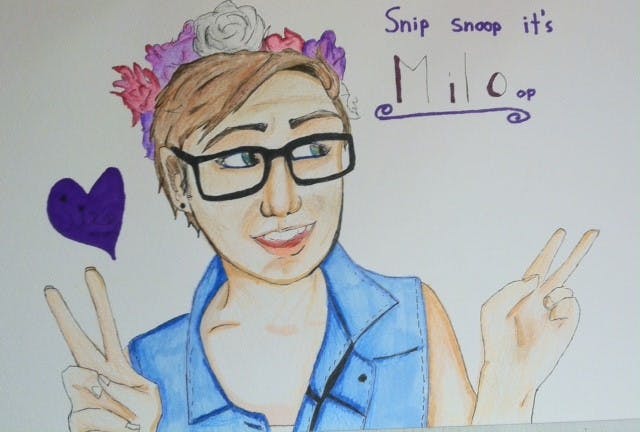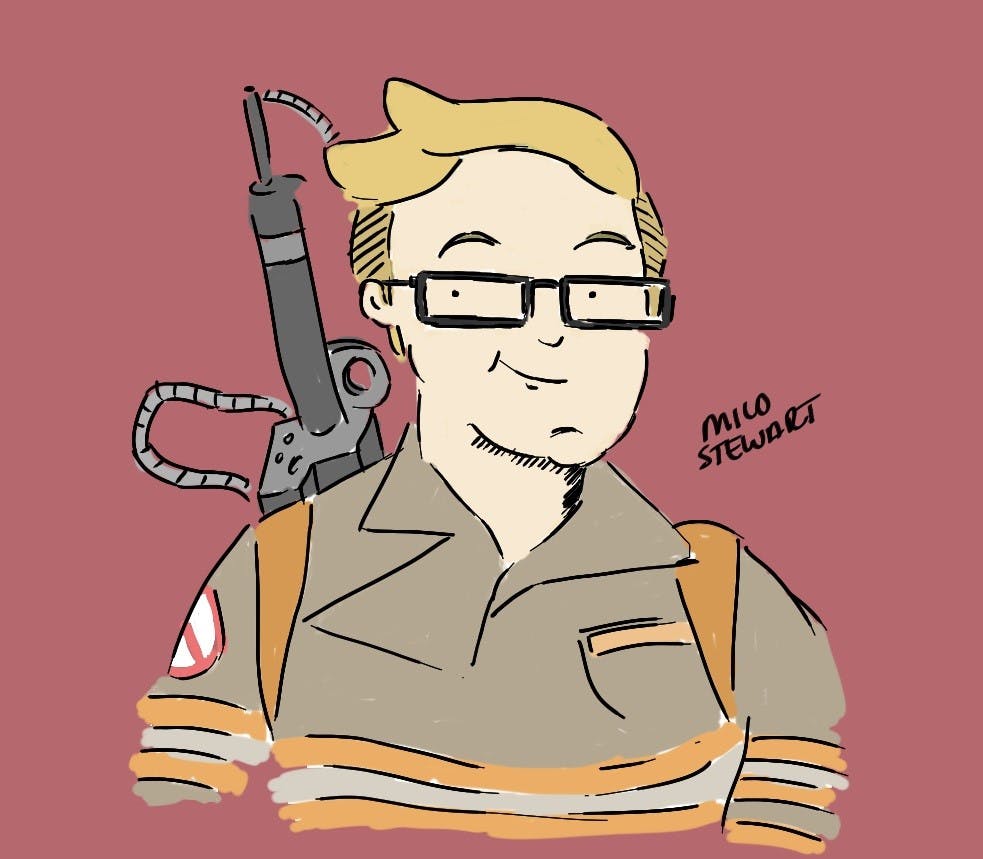Milo Stewart doesn’t care about your cisgender feelings. That’s what the description on his YouTube channel read anyway when he posted the videos that would make him one of the most infamous transgender vloggers almost overnight.
“All cisgendered people are transphobic, just as all men hold misogynistic views, and all white people are racist,” Stewart says in the video about being an ally to transgender people.
Stewart adds that being an ally is an uncomfortable position, and puts his face closer and closer to the camera asking, “Are you uncomfortable yet? How about now?”
Stewart did make a lot of people uncomfortable with that video, and another one where he said roughly the same thing. But they weren’t the people he was trying to reach.
Cue responses from angry, cis white dudes.
“I’m none of these things alright? You can’t just come on here with your crazy fucking face looking at me like you want to hang me in a tube sock and beat me and just say that I’m all these things, I’m fucking offended,” howls YouTuber Daz Games at his screen in disbelief.
Stewart has a fairly small following, but many more prominent YouTubers made videos bashing him. The Daily Dot reached out to several of them, but only Daniel Sulzbach, who goes by MrRepzion, agreed to an interview. In the video, he calls Stewart an “ungrateful fucking cunt” and says “you are literally not capable of thinking a rational fucking thought.”
Notably, it’s tamer than many of the others. “I think Milo’s intentions may be good, but ultimately I think she’s very confused and she doesn’t really understand a lot of what she says and connotations in terms of how they anger so many people,” he says, misgendering Stewart. Sulzbach doesn’t believe in political correctness and describes himself as “anti-social justice warrior.”
“Nobody wants to be called [racist or transphobic],” he explained. “People like myself who grew up always taught to accept people for who they are—no matter what they are, their skin color, it doesn’t matter—when you condemn people and make them out to all be the enemy you’re going to get a massive backlash.”
Stewart had somewhere in the ballpark of 8,000 subscribers when he initially posted the videos, but MrRezpion has more than 500,000 and some of the other YouTubers have millions. One who wears the moniker “cyber-Hitler” like a badge of honor has nearly 5 million followers and has made three videos attacking Stewart.
“Gender identity? Dude, I’m so sick of this fucking shit,” YouTuber LeafyIsHere says in a response video. “Listen, if you want to say you’re a fruit rollup or a mailbox or a fucking dildo go ahead, but you were born a boy or a girl OK period. There’s not fucking debate. You’re are literally a boy or a girl when you are born OK.”
That attention from larger YouTubers who vehemently disagree with Stewart has led to an influx of comments misgendering, threatening, and cursing at him. YouTube took down one of the videos from LeafyIsHere where he referred to Stewart as “it” and called him a “creature,” but that just fueled the fire, sending over more hate-filled comments.
Stewart thinks YouTube made a mistake when it took the video down.
“If they’re going to take down videos, don’t take down videos that are of a specific person who could easily be harassed,” Stewart suggests. “Don’t provide that kind of target for the audiences.”
The Daily Dot asked a YouTube spokesperson multiple times if concerns about creating a target are considered when deciding whether to remove content. While that question was never addressed, information sent to the Daily Dot over email suggests YouTube does not take this into account, and only considers whether content violates its policies when determining what videos to take off the site.
Stewart’s audience has doubled since the roast videos started, but it’s radically different. Once largely comprised of people interested in conversations about the LGBTQ community, it’s now filled with hate-watchers leaving vitriolic comments. A message about everyone being racist and transphobic because of our unconscious biases may have caused a tense and impassioned discussion on his old channel, but to anti-feminists and anti-social justice vloggers, Stewart’s words are an attack.
Pandering to privilege
Stewart is not here to hand-feed a wider audience.
“I don’t really have the energy to try to broaden the perspectives of people who generally don’t try at all to inform themselves about the community,” Stewart explains. “There are a lot of YouTubers who do that, and I feel like that’s not interesting to me.”
Queer, feminist YouTuber Ashley Mardell, who has collaborated with Stewart, takes a softer approach to her advocacy.
“Milo’s more abrasive, and I don’t think there’s anything wrong with that because the things that he’s saying, in my opinion, are correct,” Mardell says. “Why do we have to pander to people with privilege and… Why do we have to make it soft and easily consumable for them? They already experience so much comfort.”
Mardell and other advocates often present their videos in a way that’s more palatable to a general audience to build bridges, but Mardell says they also self-censor to avoid backlash.
“These larger channels are silencing others,” Mardell explains. “Because we’re scared that they’re going to send a lot of harassment our way.”
Beyond the stress brought on by the threats and hate, all that negativity is bad for business.
“The way my audience works is a lot more like the way an audience of a huge YouTuber with millions of subscribers works,” Stewart explains. “When you’re that popular, the comments are less of a focus on the community building and naturally as you get a bigger audience, there are more trolls. I just happen to be a fairly small YouTuber who unfortunately has to deal with that.”
That audience limits how he can interact with his fans and other users. For instance, many YouTubers create videos with other users who make similar content to establish relationships and grow their following, but he says most users who want to collaborate with him now want to debate him, something that would likely bring more negative comments his way.
“The part I’m having most difficulty dealing with is it’s harder for me to collaborate with other YouTubers now because I personally don’t want to subject my friends to the trolls that may come from my channel,” he says.
Policing his identity
Opposition to Stewart isn’t just coming from men’s rights activists and the anti-social justice trolls. It’s also coming from within transgender communities. Several response videos feature transgender YouTubers disagreeing with Stewart.
To some, Stewart is the face of social justice gone wrong, and they want to show that the controversial YouTuber doesn’t represent them. But other criticisms of him go beyond his ideology and reflect on a larger debate within some transgender communities that’s become especially acrimonious on the internet.
At issue here is who gets to claim a transgender identity. Some argue Stewart does not and call him a “transtrender,” charging that he identifies as transgender to get attention. Stewart identifies as non-binary—which to him means he is neither entirely male nor entirely female. Some binary transgender people who have or feel the need to medically transition see non-binary and genderqueer people as co-opting their identity without experiencing the same struggle.
“Milo could never live the life that I’ve lived and that’s not to say that I’m special, but my lived experiences are very much different than Milo’s,” transgender YouTuber Blaire White explains. “Milo is at the same time claiming to be the exact same thing as me, and I don’t like that.”
White describes herself as “right-leaning” and has called herself a men’s rights activist in the past. She sees non-binary identities as artificial and harmful to transgender people. “It seems to me Milo mistakes clothing preferences and hobbies or general gendered interests for being a different gender altogether,” White says. In her eyes, Stewart is performing being trans much like former NAACP chapter president Rachel Dolezal performed being black.
White argues part of the transgender experience is gender dysphoria, the discomfort or distress someone experiences when their body doesn’t align with their gender identity.
Feminist YouTuber Ashley Mardell identifies as genderqueer and argues the policing of transgender identities based on gender dysphoria is unproductive and simplifies the human experience.
“To argue that non-binary people don’t experience dysphoria is inaccurate,” she says. “A lot of them do. A lot of them don’t too. Also some binary trans people don’t experience dysphoria.”
https://www.youtube.com/watch?v=sLfcsccTXww
Stewart does have some gender dysphoria, though acknowledges his experience is different than the experience of many binary transgender people. Even so, the policing of his identity has gotten so bad on Tumblr that Stewart’s nearly stopped using the platform.
“[Some binary transgender people] talk about how much of a struggle it’s been and then say that I’m mocking them because they don’t think that I’ve gone through any struggles to be where I am today,” Stewart says. “People assume a lot about my experiences coming out and being trans. They think they know what my experiences are just from the parts of my life I put on my YouTube.”
White’s biggest complaint about Stewart is rooted in respectability politics. Not only is Stewart non-binary and pushing against society’s notions of gender, but he’s also publicly espousing controversial opinions. White says this otherizes and makes life harder for transgender people.
“Trans people are really looked at as a joke because of people like Milo, unfortunately,” White says.
The language around gender identity is muddled and continually evolving, but under the most accepted definitions of the word “transgender,” people like Stewart are included. Many LGBTQ advocacy organizations such as the National Center for Transgender Equality define transgender in a way that encompasses genderqueer and non-binary identities. Today even the American Psychological Association defines transgender as an umbrella term that includes non-binary people.
“I know a lot of non-binary people who don’t think the transgender umbrella encompasses them,” Stewart says. “I think it’s your prerogative how you identify. I just don’t think people should tell others how they can and cannot identity.”
How the trolls keep winning
With harsh criticism coming from all sides in the form of vitriolic response videos, death threats, and accusations of being a “transtrender,” Stewart is overwhelmed. For a YouTuber of his size, an impressive number of people watch Stewart’s videos, but the gap in the number of people liking and disliking his content is wide. Take for instance a video he posted two months ago: about 800 likes and 19,000 dislikes. Stewart hasn’t monetized his channel, meaning all those views from hate-watchers don’t translate to actual cash and a silver lining.
The hateful comments are not likely to fizzle out, either. Riley Dennis, a transfeminine lesbian Stewart has made videos with, says because of the algorithms YouTube uses, Stewart’s videos will probably continue to be recommended to hostile audiences. According to YouTube, videos are recommended to users based on their watch history and what other people watching the same videos are watching. That means YouTube’s algorithms are linking Stewart’s videos with content from the people criticizing him.
“If someone watching a response video goes and watches Milo’s video, the kinds of videos that they watch, all these hateful [men’s rights activist videos] get associated with Milo’s video because the same people are watching them,” Dennis explains. “It perpetuates itself. People who aren’t searching for Milo’s content and are just watching some ‘fuck feminist’ video are getting recommended Milo’s content.”
Riley says many activist users face harassment on YouTube, but the hatred directed at Stewart is a beast of its own. Online harassment isn’t an issue that’s new for or unique to YouTube, but Stewart’s experience is a case study in how woefully lacking the platform can be when it comes to dealing with harassment.
The site has community standards and relies on users to flag inappropriate content containing hate speech, harassment, and threats. Some trusted users can mass-flag content, and YouTube recently launched a program to give more users that power. Once flagged, YouTube can demonetize or remove videos that do not meet its community standards. Users can also review comments before they’re made public, allow other users to moderate their comments, or turn off comments altogether. A YouTube spokesperson sent the Daily Dot a statement addressing concerns about harassment for this story via email, but multiple requests for an interview were declined:
We are deeply troubled by reports of harassment on YouTube, and we quickly remove videos violating our policies when flagged by our users. Beyond our policies, we continue to invest in new solutions to address this issue such as creating tools that allow people to manage comments on their own channels and working with creators who are helping tackle online hate by promoting awareness, tolerance and empathy.
Stewart thinks YouTube should be doing more to moderate hateful comments and videos, but says the platform needs to be careful in how it does so.
“YouTubers that make harassing roasting videos have a lot of extremely loyal fan bases and any attempt that YouTube would make to try to combat this trend would most likely upset those fan bases,” Stewart says.
It’s hard to imagine a YouTube where Stewart doesn’t get harassed any time soon, and the recent influx of hateful comments and angry videos has him rethinking his channel.
“My perspective on the idea of making people uncomfortable has changed because now I understand how violent and how explosive people can react when they are made to be uncomfortable,” he says.
Stewart may not care about your cisgender feelings, but he does care about his own safety and mental health. Stewart’s voice is tempered by the fear of doxing and exhaustion from constant harassment.
The trolls are winning. They gain ground every time a voice like Stewart’s is quieter. While many cling self-righteously to arguments about free speech, they know a barrage of hate can silence dissent, and so they keep on—one comment at a time.




